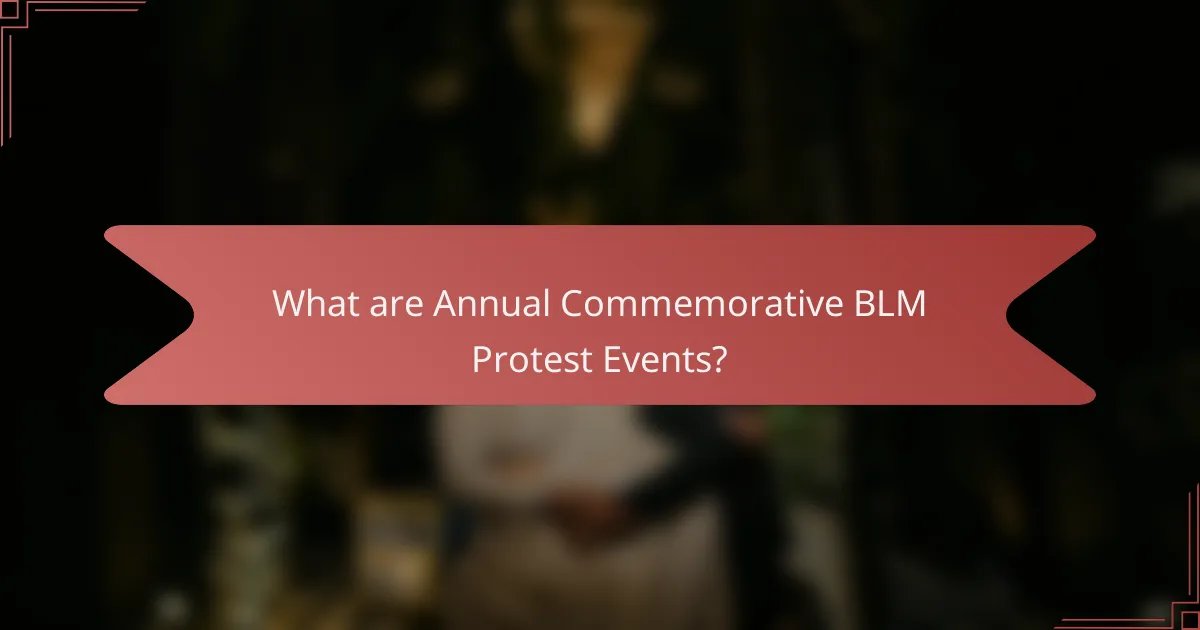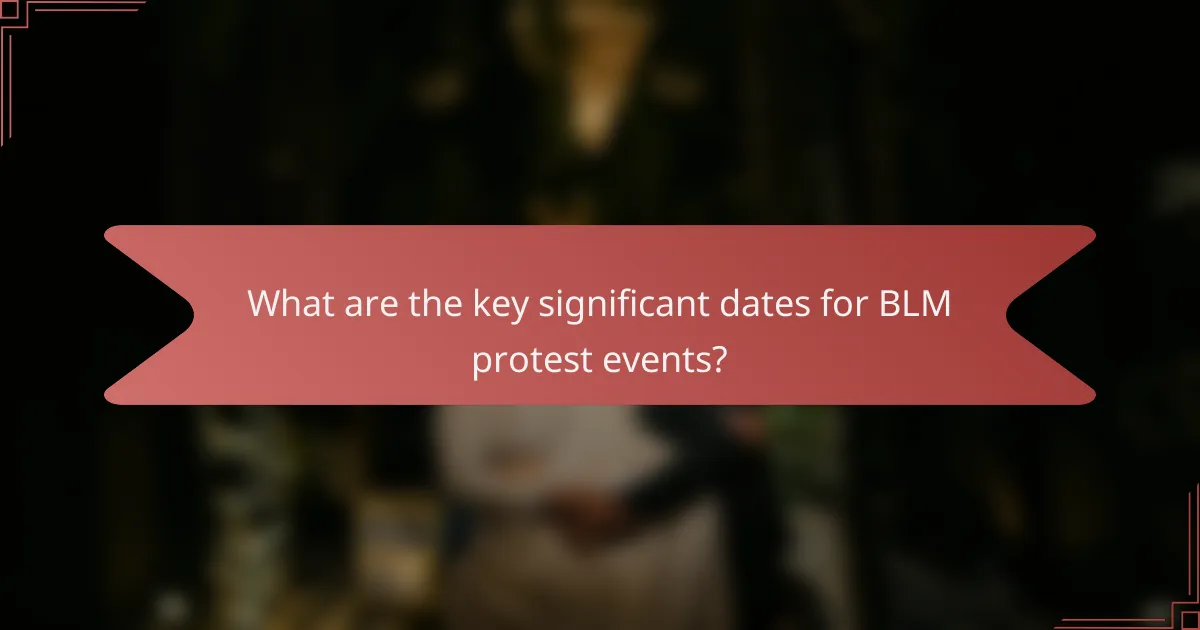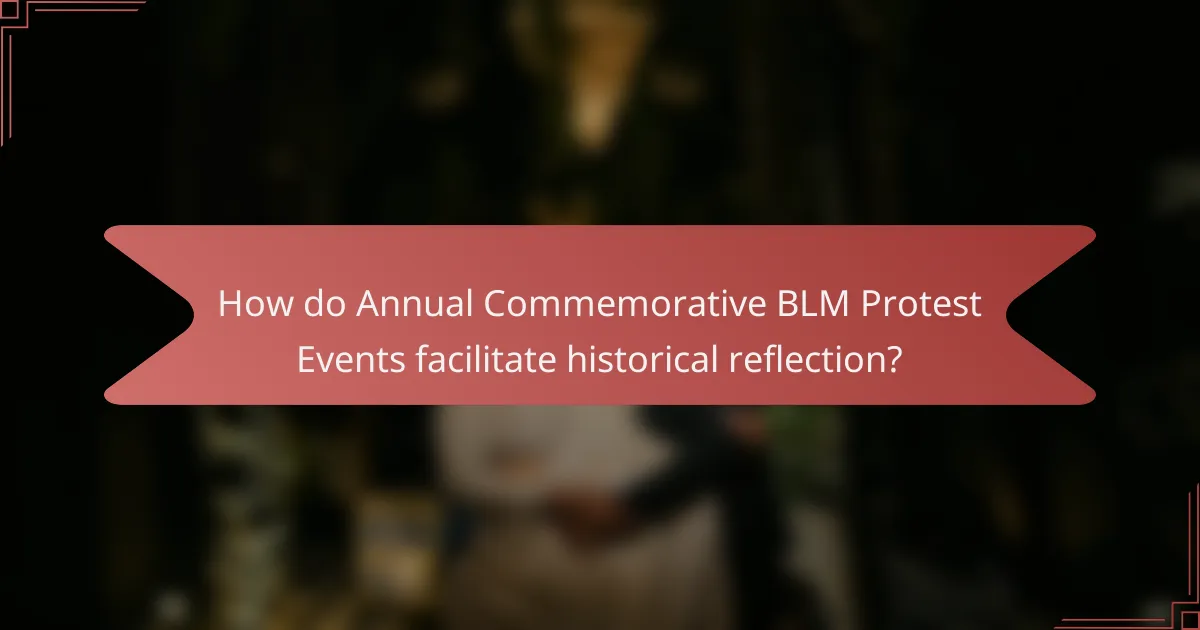
What are Annual Commemorative BLM Protest Events?
Annual Commemorative BLM Protest Events are organized gatherings that honor the Black Lives Matter movement. These events typically occur on significant dates related to racial justice and police violence. Examples include the anniversary of George Floyd’s death on May 25. These protests aim to raise awareness, promote social justice, and commemorate victims of systemic racism. They often feature speeches, marches, and community engagement activities. Such events have gained national and international participation, reflecting widespread support for the movement. They serve as a platform for advocacy and solidarity against racial injustice.
Why are these events significant in the context of social justice?
These events are significant in the context of social justice because they highlight systemic racism and inequality. They serve as a platform for marginalized voices to demand change. Each annual protest commemorates pivotal moments in the fight for civil rights. Historical events, like the killing of George Floyd, catalyzed widespread activism. Statistics show increased public awareness and support for racial justice initiatives following these protests. The gatherings foster community solidarity and encourage civic engagement. They also influence policy discussions and reforms at local and national levels. Overall, these events play a crucial role in advancing social justice movements.
What historical events do these protests commemorate?
These protests commemorate significant events in the history of racial injustice and civil rights. They specifically honor the lives of individuals who have been victims of police violence. Key events include the death of George Floyd in 2020, which sparked global protests. Another important event is the acquittal of George Zimmerman in the shooting of Trayvon Martin in 2013. These protests also reflect on the historical struggle for civil rights in the United States. They serve as a reminder of the ongoing fight against systemic racism. Each protest aims to raise awareness about racial inequality and injustice. The protests are rooted in a long history of activism for black lives and rights.
How do these events reflect the ongoing struggle for racial equality?
Annual commemorative BLM protest events reflect the ongoing struggle for racial equality by highlighting systemic injustices. These events serve as a platform for marginalized voices. They raise awareness about police violence and racial discrimination. Historical context shows that protests have roots in civil rights movements. For instance, the March on Washington in 1963 emphasized the demand for equality. Recent protests have reignited discussions around systemic racism. They mobilize communities to advocate for policy changes. Statistics indicate that Black Americans face higher rates of incarceration and police violence. Thus, these events underscore the persistent fight for justice and equality.
What themes are commonly associated with BLM protest events?
Common themes associated with BLM protest events include racial justice, police brutality, and systemic racism. Racial justice emphasizes equality and fair treatment for all races. Police brutality highlights the excessive use of force by law enforcement against marginalized communities. Systemic racism addresses deeply ingrained societal structures that perpetuate inequality. Other themes include community empowerment, solidarity, and intersectionality. Community empowerment focuses on uplifting voices within marginalized groups. Solidarity emphasizes unity among diverse communities in the fight against injustice. Intersectionality recognizes how various forms of discrimination overlap, affecting individuals differently. These themes are evident in the messaging, slogans, and artwork seen at protests.
How do these themes evolve over time?
Themes in Annual Commemorative BLM Protest Events evolve through historical context and societal changes. Initially, themes focused on police brutality and racial injustice. Over time, they expanded to include systemic racism and intersectionality. The emergence of social media influenced the way themes are communicated and mobilized. Each year, significant events, like the deaths of individuals such as George Floyd, shape the themes. Additionally, the incorporation of diverse voices has enriched the narrative. As society progresses, themes adapt to reflect current issues and public sentiment. This evolution illustrates the dynamic nature of social movements in response to ongoing challenges.
What role do specific themes play in mobilizing communities?
Specific themes play a crucial role in mobilizing communities by providing a shared focus and purpose. They create a common narrative that resonates with individuals’ experiences and values. Themes like justice, equality, and systemic racism unite diverse groups under a single cause. This unity fosters a sense of belonging and collective identity among participants. For instance, the theme of “Black Lives Matter” has galvanized millions to advocate for racial justice. Events centered around specific themes often attract media attention, amplifying the message and reaching wider audiences. Research shows that thematic framing increases engagement and participation rates in social movements.

What are the key significant dates for BLM protest events?
Key significant dates for BLM protest events include May 25, 2020, when George Floyd was murdered, sparking widespread protests. Another important date is June 6, 2020, which saw one of the largest protests in U.S. history. On July 13, 2013, the BLM movement was officially founded following the acquittal of George Zimmerman in the Trayvon Martin case. Additionally, August 9, 2014, marks the anniversary of Michael Brown’s death in Ferguson, Missouri, which catalyzed protests. Each of these dates represents pivotal moments in the ongoing struggle for racial justice and equality.
How are these dates determined and what do they signify?
The dates for annual commemorative BLM protest events are determined based on historical events and milestones in the fight for racial justice. These dates often signify key moments in the Black Lives Matter movement or broader civil rights history. For example, the anniversary of the death of George Floyd is observed to honor his memory and raise awareness of police brutality. Other significant dates may include the anniversary of the Civil Rights Act or the March on Washington. These commemorations serve to educate the public, mobilize supporters, and reflect on ongoing struggles against systemic racism. Events are typically organized by local chapters or coalitions, ensuring relevance to the community’s specific context and history.
What major events are commemorated on these dates?
It is not possible to provide a definitive answer regarding the major events commemorated on unspecified dates. Each date may hold different significance based on historical context, regional observances, and specific movements. Without specific dates provided, it is not feasible to identify the major events associated with them.
How do communities engage with these significant dates?
Communities engage with significant dates through organized protests, educational events, and social media campaigns. These activities commemorate historical events related to racial justice and equality. For example, many communities hold marches on dates like Juneteenth or Martin Luther King Jr. Day. These events foster unity and raise awareness about ongoing social issues. Educational workshops often accompany these gatherings, providing historical context and discussing current challenges. Social media platforms amplify these efforts, allowing for broader participation and sharing of personal stories. According to a 2020 Pew Research study, 55% of Black Americans reported participating in protests to advocate for racial equality.
What is the impact of these significant dates on public awareness?
Significant dates in the context of BLM protest events greatly enhance public awareness. These dates serve as focal points for mobilization and advocacy. They remind the public of ongoing social justice issues. For example, the anniversary of George Floyd’s death has sparked widespread protests and discussions. Studies indicate that such events can lead to increased media coverage. This coverage often amplifies the message of racial equality. Additionally, significant dates can foster community solidarity and engagement. They encourage individuals to participate in discussions and actions for change. Overall, these dates play a crucial role in raising awareness and promoting social justice initiatives.
How do these dates influence media coverage of racial issues?
Significant dates related to racial issues shape media coverage by providing focal points for discussion and activism. These dates often coincide with historical events, such as Martin Luther King Jr. Day or the anniversary of pivotal protests. Media outlets utilize these occasions to highlight ongoing racial disparities and injustices. For example, during Black History Month, coverage often increases on topics related to systemic racism. Research shows that media attention peaks around these dates, influencing public awareness and discourse. This pattern can amplify calls for action and solidarity within communities. Thus, these dates serve as catalysts for media narratives surrounding racial issues.
What role do social media campaigns play in these commemorations?
Social media campaigns play a crucial role in commemorations of events like the BLM protests. They facilitate widespread awareness and engagement among diverse audiences. Campaigns help to amplify messages of social justice and equality. They create platforms for sharing personal stories and experiences related to racial injustice. Social media also enables real-time updates about events and activities. This immediacy fosters community and solidarity among participants. Additionally, campaigns can mobilize support for policy changes and advocacy efforts. Statistics show that social media significantly increases participation in commemorative events, enhancing their impact.

How do Annual Commemorative BLM Protest Events facilitate historical reflection?
Annual Commemorative BLM Protest Events facilitate historical reflection by commemorating significant moments in the fight against racial injustice. These events provide a platform for community members to share personal stories and experiences. They encourage dialogue about past and present struggles faced by marginalized communities. Educational workshops often accompany these events, highlighting historical context and systemic issues. Participants engage in discussions that connect historical events to current realities. This connection fosters a deeper understanding of the ongoing impact of racism. Furthermore, these gatherings serve as a reminder of the progress made and the work still needed. They create a collective memory that honors those who have fought for civil rights.
What narratives are highlighted during these events?
The narratives highlighted during Annual Commemorative BLM Protest Events focus on racial equality and social justice. These events emphasize the ongoing struggle against systemic racism. They also reflect on historical injustices faced by Black communities. Participants often share personal stories of discrimination and resilience. The events aim to raise awareness about police brutality and its impact. Additionally, they promote solidarity among diverse communities. The narratives encourage civic engagement and policy change. Overall, these events serve as a platform for amplifying marginalized voices.
How do personal stories contribute to the collective memory?
Personal stories contribute to collective memory by providing individual perspectives that enrich shared experiences. They humanize historical events, making them relatable and impactful. For example, during the Civil Rights Movement, personal narratives highlighted the struggles faced by individuals, fostering empathy and understanding. These stories often circulate through oral traditions, literature, and media, creating a tapestry of memories. Research indicates that collective memory is shaped by these narratives, as seen in studies on community storytelling. Such storytelling helps preserve history and influences cultural identity.
What lessons can be learned from past protests?
Past protests teach valuable lessons about social change and activism. They highlight the importance of organization and unity among participants. Effective communication strategies can mobilize larger audiences. Historical examples, such as the Civil Rights Movement, demonstrate the power of nonviolent resistance. Protests can raise awareness and influence public opinion. They also show the need for clear goals and demands. Successful movements often adapt to changing circumstances and opposition. Finally, documenting and reflecting on past actions can guide future efforts.
How do these events promote community engagement and activism?
Annual commemorative BLM protest events promote community engagement and activism by fostering collective awareness and solidarity. These events provide a platform for individuals to voice concerns about racial injustice and inequality. They encourage participation through organized marches, discussions, and educational workshops. Community members often collaborate to plan and execute these events, enhancing local connections. Studies show that participation in such events can increase civic engagement and voter turnout. Additionally, these gatherings often attract media attention, amplifying the movement’s message. The collective experience of attending such events can strengthen community bonds and inspire ongoing activism.
What strategies can be employed to encourage participation?
Engaging community members is essential to encourage participation in annual commemorative BLM protest events. Strategies include utilizing social media campaigns to spread awareness. Social media can reach diverse audiences quickly and effectively. Hosting informational sessions can educate attendees about the event’s significance. These sessions can clarify the goals and history of the BLM movement. Collaborating with local organizations can also amplify outreach efforts. Partnerships can leverage existing networks to attract more participants. Offering incentives, such as food or merchandise, can increase attendance. Providing these perks creates a welcoming atmosphere. Surveys can gather feedback to improve future events. Understanding community needs enhances engagement.
How can individuals support these events effectively?
Individuals can support Annual Commemorative BLM Protest Events effectively by participating actively in the events. Attending protests shows solidarity and raises awareness. Sharing information about the events on social media amplifies their reach. Volunteering to help organize events adds valuable support. Donating to organizations involved in these events provides crucial financial backing. Educating oneself and others about the issues fosters informed discussions. Supporting local Black-owned businesses during these events helps the community economically. Engaging in peaceful advocacy encourages positive dialogue and change.
What are some best practices for organizing an Annual Commemorative BLM protest event?
To organize an Annual Commemorative BLM protest event effectively, start by establishing clear goals. Define the purpose of the protest and the message you want to convey. Next, assemble a diverse planning committee. Include members from various backgrounds to ensure inclusivity and representation.
Select a significant date for the event. Historical dates related to BLM milestones can enhance relevance. Secure necessary permits and permissions from local authorities early in the planning process. This ensures compliance with local regulations.
Create a detailed event agenda. Outline the schedule, including speakers, performances, and activities. Promote the event through social media and community outreach. Engaging local organizations can broaden your reach.
Ensure safety measures are in place. Coordinate with local law enforcement and have a plan for emergencies. Finally, gather feedback after the event. This helps improve future protests and strengthens community ties.
Annual Commemorative BLM Protest Events are organized gatherings that honor the Black Lives Matter movement and commemorate significant dates related to racial justice and police violence. These events aim to raise awareness, promote social justice, and reflect on historical injustices faced by marginalized communities. Key themes include racial justice, police brutality, and community empowerment, with specific dates marking pivotal moments in the ongoing struggle for equality. The article explores the significance of these events, the narratives they highlight, and their impact on public awareness and community engagement. Additionally, it outlines best practices for organizing such events and strategies for effective participation and support.